Representatives of the UGCC took part in a plenary assembly of the Council of Episcopal Conferences of Europe
Sunday, 12 October 2008, 23:00 From September 30 to October 3, 2008, the annual plenary session of the Council of Episcopal Conferences of Europe (Consilium Conferentiarum Episcoporum Europae (CCEE)), in which the heads and authorized representatives of 34 national episcopal conferences of Europe took part, was conducted in Budapest. From the Synod of Bishops of the UGCC His Beatitude Lubomyr, Major Archbishop of Kyiv and Halych, and Bishop Bohdan (Dzyurakh), secretary of the Synod of Bishops of the UGCC and auxiliary bishop of the Kyiv Archeparchy, took part in the work of the CCEE.
From September 30 to October 3, 2008, the annual plenary session of the Council of Episcopal Conferences of Europe (Consilium Conferentiarum Episcoporum Europae (CCEE)), in which the heads and authorized representatives of 34 national episcopal conferences of Europe took part, was conducted in Budapest. From the Synod of Bishops of the UGCC His Beatitude Lubomyr, Major Archbishop of Kyiv and Halych, and Bishop Bohdan (Dzyurakh), secretary of the Synod of Bishops of the UGCC and auxiliary bishop of the Kyiv Archeparchy, took part in the work of the CCEE.
 From September 30 to October 3, 2008, the annual plenary session of the Council of Episcopal Conferences of Europe (Consilium Conferentiarum Episcoporum Europae (CCEE)), in which the heads and authorized representatives of 34 national episcopal conferences of Europe took part, was conducted in Budapest. From the Synod of Bishops of the UGCC His Beatitude Lubomyr, Major Archbishop of Kyiv and Halych, and Bishop Bohdan (Dzyurakh), secretary of the Synod of Bishops of the UGCC and auxiliary bishop of the Kyiv Archeparchy, took part in the work of the CCEE.
The theme of the current meeting was "The Church and the Mass-Media." The heads of Churches and chairmen of conferences considered, on the one side, how the Church’s life lights up on the pages of society’s media, and, on the other side, how the Church should co-operate with the world of the mass-media to spread the Gospel, and also how effectively to use modern technologies more in the middle of the Church for evangelism and pastoral ministry.
Before the plenary assembly, questioning was conducted in the separate episcopal conferences (synods). Questioning was conducted in order to produce a model and strategy of activity of the Church in Europe on the basis of the answers. In particular such questions were posed: Are there phenomena in the press directed against the Church, Christians and Christianity? How does the Church counter this? Is there a juridical base and other possibilities for this? In addition to this it was suggested to give examples of positive experience, when there is public media in the Church, and to specify how good and wide are the possibilities of using the secular media for the activity of the Church (for statistics on the Greek-Catholic Mass-Media, see the addendum).
In addition, according to the report of Bishop Bohdan, during the plenary meetings important themes for the European continent generally and for the Church in Europe in particular, migration, vocation, catechesis, Catholic schools, and chaplaincy in higher educational institutions will be considered. Because Europe is more and more opening itself to the world, the Churches also wish to make more close contacts with other parts of the world. For this reason this year there is something new: questions of the Church in Africa and cooperation between bishops of Africa and Europe are to be examined.
For this purpose for participating in the assembly representatives from Latin America and other continents have been invited, in order jointly to consider the importance of deepening cooperation. The theme of ecumenism, which is important for the European continent, was presented by the President of the CCEE, Cardinal Peter Erdo. "For us this theme is very close, because Ukraine is a place where various Christian confessions coexist peacefully. The UGCC feels a certain obligation and vocation to assist in approaching Christians for the possible joining of Christian Churches in Ukraine. Therefore our participating in the plenary meeting is useful to both sides, both Ukrainian and European," said Bishop Bohdan (Dzyurakh) regarding this.
Information
In Europe there are 34 national Catholic episcopal conferences which form one European structure, the Council of Episcopal Conferences of Europe, which since 2006 has been headed by the president of the council, Cardinal Peter Erdo.
Plenary assemblies enable the separate episcopal conferences to communicate and to produce a unified position in relation to the various challenges of our days. For the UGCC such meetings are especially important, because through them it enters Europe and by them, in particular, the perception of Ukraine as a European state is formed.
Addendum
Statistics on the Greek-Catholic media in Ukraine
Amount of the general church-media of the UGCC in Ukraine 9
Amount of journalists in the general-church media 36
Amount of eparchial publications 17
Amount of journalists in eparchial newspapers 62
Amount of press-services in eparchies 10
Amount of operating eparchial Internet pages of the UGCC 9
From September 30 to October 3, 2008, the annual plenary session of the Council of Episcopal Conferences of Europe (Consilium Conferentiarum Episcoporum Europae (CCEE)), in which the heads and authorized representatives of 34 national episcopal conferences of Europe took part, was conducted in Budapest. From the Synod of Bishops of the UGCC His Beatitude Lubomyr, Major Archbishop of Kyiv and Halych, and Bishop Bohdan (Dzyurakh), secretary of the Synod of Bishops of the UGCC and auxiliary bishop of the Kyiv Archeparchy, took part in the work of the CCEE.
The theme of the current meeting was "The Church and the Mass-Media." The heads of Churches and chairmen of conferences considered, on the one side, how the Church’s life lights up on the pages of society’s media, and, on the other side, how the Church should co-operate with the world of the mass-media to spread the Gospel, and also how effectively to use modern technologies more in the middle of the Church for evangelism and pastoral ministry.
Before the plenary assembly, questioning was conducted in the separate episcopal conferences (synods). Questioning was conducted in order to produce a model and strategy of activity of the Church in Europe on the basis of the answers. In particular such questions were posed: Are there phenomena in the press directed against the Church, Christians and Christianity? How does the Church counter this? Is there a juridical base and other possibilities for this? In addition to this it was suggested to give examples of positive experience, when there is public media in the Church, and to specify how good and wide are the possibilities of using the secular media for the activity of the Church (for statistics on the Greek-Catholic Mass-Media, see the addendum).
In addition, according to the report of Bishop Bohdan, during the plenary meetings important themes for the European continent generally and for the Church in Europe in particular, migration, vocation, catechesis, Catholic schools, and chaplaincy in higher educational institutions will be considered. Because Europe is more and more opening itself to the world, the Churches also wish to make more close contacts with other parts of the world. For this reason this year there is something new: questions of the Church in Africa and cooperation between bishops of Africa and Europe are to be examined.
For this purpose for participating in the assembly representatives from Latin America and other continents have been invited, in order jointly to consider the importance of deepening cooperation. The theme of ecumenism, which is important for the European continent, was presented by the President of the CCEE, Cardinal Peter Erdo. "For us this theme is very close, because Ukraine is a place where various Christian confessions coexist peacefully. The UGCC feels a certain obligation and vocation to assist in approaching Christians for the possible joining of Christian Churches in Ukraine. Therefore our participating in the plenary meeting is useful to both sides, both Ukrainian and European," said Bishop Bohdan (Dzyurakh) regarding this.
Information
In Europe there are 34 national Catholic episcopal conferences which form one European structure, the Council of Episcopal Conferences of Europe, which since 2006 has been headed by the president of the council, Cardinal Peter Erdo.
Plenary assemblies enable the separate episcopal conferences to communicate and to produce a unified position in relation to the various challenges of our days. For the UGCC such meetings are especially important, because through them it enters Europe and by them, in particular, the perception of Ukraine as a European state is formed.
Addendum
Statistics on the Greek-Catholic media in Ukraine
Amount of the general church-media of the UGCC in Ukraine 9
Amount of journalists in the general-church media 36
Amount of eparchial publications 17
Amount of journalists in eparchial newspapers 62
Amount of press-services in eparchies 10
Amount of operating eparchial Internet pages of the UGCC 9
Information Department of the UGCC
LATEST NEWS

We can imagine what the prayer of the prisoners in the Russian torture centers in the Ukrainian Kharkiv region was like – Head of the UGCC on the 206th day of the war 17 September
A vast cemetery, a mass burial, was found near the city of Izyum, in which more than 400 innocently killed and tortured people have already been...
-
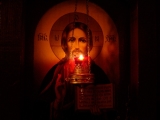 Глава УГКЦ у 158-й день війни: «Нехай Господь прийме з уст нашої Церкви псалми та моління за всіх тих, які особливо просять нашої молитви»
Глава УГКЦ у 158-й день війни: «Нехай Господь прийме з уст нашої Церкви псалми та моління за всіх тих, які особливо просять нашої молитви»
-
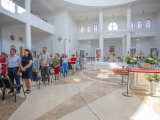 «Сила, яка походить із вірності Христові, є стержнем, який ніхто не може зламати», – Блаженніший Святослав
«Сила, яка походить із вірності Христові, є стержнем, який ніхто не може зламати», – Блаженніший Святослав
-
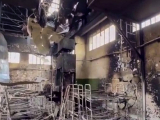 Глава УГКЦ у 157-й день війни: «В ім’я Боже ми засуджуємо звірства в Оленівці і світ повинен це засудити як особливий вияв дикості й жорстокості»
Глава УГКЦ у 157-й день війни: «В ім’я Боже ми засуджуємо звірства в Оленівці і світ повинен це засудити як особливий вияв дикості й жорстокості»
-
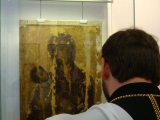 «Боже, почуй наш плач і поспіши нам на допомогу і порятунок!», – Глава УГКЦ у 156-й день війни
«Боже, почуй наш плач і поспіши нам на допомогу і порятунок!», – Глава УГКЦ у 156-й день війни
-
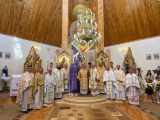 «Бог йому дав серце і душу українського народу»: відбулася щорічна проща до Прилбичів з нагоди уродин митрополита Андрея Шептицького
«Бог йому дав серце і душу українського народу»: відбулася щорічна проща до Прилбичів з нагоди уродин митрополита Андрея Шептицького
-
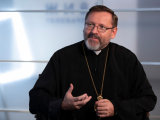 Глава УГКЦ: «Я горджуся українськими патріотами, які без найменшої краплі ненависті готові захищати своє»
Глава УГКЦ: «Я горджуся українськими патріотами, які без найменшої краплі ненависті готові захищати своє»
-
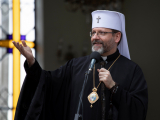 Блаженніший Святослав закликав українську молодь скласти присягу на вірність Христові
Блаженніший Святослав закликав українську молодь скласти присягу на вірність Христові
-
 Глава УГКЦ у 155-й день війни: «Помолімося, щоб не втратити скарбу віри князя Володимира»
Глава УГКЦ у 155-й день війни: «Помолімося, щоб не втратити скарбу віри князя Володимира»
-
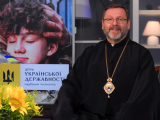 Блаженніший Святослав у День державності України: «Наша Держава – це для нас питання життя або смерті»
Блаженніший Святослав у День державності України: «Наша Держава – це для нас питання життя або смерті»
-
 Глава УГКЦ у 154-й день війни: «Нехай Господь Бог прийме у свої вічні обійми журналістів, які віддали за правду своє життя в Україні»
Глава УГКЦ у 154-й день війни: «Нехай Господь Бог прийме у свої вічні обійми журналістів, які віддали за правду своє життя в Україні»
-
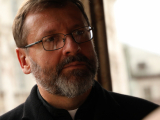 Глава УГКЦ у 153-й день війни: «Принесімо наш біль перед Боже обличчя і будьмо певні, що Він нас вислухає»
Глава УГКЦ у 153-й день війни: «Принесімо наш біль перед Боже обличчя і будьмо певні, що Він нас вислухає»
-
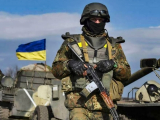 Глава УГКЦ у 152-й день війни: «Помолімся молитву заступництва за наших воїнів»
Глава УГКЦ у 152-й день війни: «Помолімся молитву заступництва за наших воїнів»
-
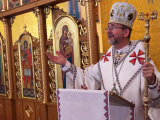 «Віруюча людина не може бути байдужою, коли бачить страждання іншої людини», – владика Богдан Дзюрах
«Віруюча людина не може бути байдужою, коли бачить страждання іншої людини», – владика Богдан Дзюрах
-
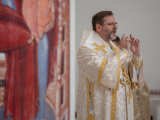 «Серед нашого страждання творімо простір для прояву Божої всемогутності», – Глава УГКЦ у 6-ту неділю після П’ятдесятниці
«Серед нашого страждання творімо простір для прояву Божої всемогутності», – Глава УГКЦ у 6-ту неділю після П’ятдесятниці
-
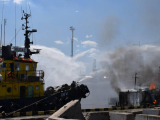 Глава УГКЦ у 151-й день війни: «Російське віроломство ми перемагаємо силою любові до нашої Батьківщини»
Глава УГКЦ у 151-й день війни: «Російське віроломство ми перемагаємо силою любові до нашої Батьківщини»

